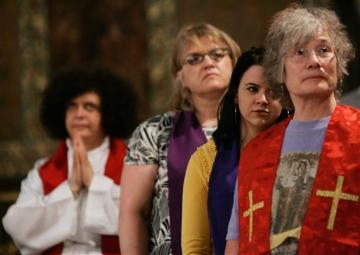
Members of the Women's Ordination. (AP Photo/Riccardo De Luca)
Among the responses to the PA grand jury report detailing—again—widespread sexual abuse of minors are suggestions that women should have greater voice in the institution. Speaking to America magazine, Hans Zollner, S.J., head of the Centre to Child Protection at the Pontifical Gregorian University in Rome, said “We need the voice of women here,” because women often “bring up the voice of those who are the most vulnerable in our society.”
Others say that an adequate response to the crisis requires women’s ordination, or that ordination together with abolishing mandatory celibacy is in order: "If we had women as equals and partners, women ordained in the Catholic Church, the church would not be in this mess, because we would have parents who would minister and who would make sure children are protected," said Bishop Bridget Mary Meehan of the Association of Roman Catholic Women Priests.
And certainly Pope Francis has called for a greater role for women in the Church, even as he rejects the possibility of ordination: he launched a commission to study the restoration of women to the diaconate, and he named an unprecedented number of women to the influential International Theological Commission (though he referred to women as “the strawberry on the cake.”) James Keenan has suggested that women could be named cardinals, so they could serve in the Roman Curia, the Church’s governing administration.
So—would having more women in leadership help with the sex abuse crisis?
First, let’s be clear. Women are already overrepresented in the US Church. Women attend services weekly at a rate that is 8% higher than men, and the number of Catholic women who pray at least daily is 18% higher than men. Lay ministers (about 80% of whom are women) now outnumber priests in the US, and laypeople in formation VASTLY outnumber ordination candidates. In short, the Church and its ministry skew female, and will do so increasingly in the future.
But authority? Even positions of diocesan leadership that are open to the non-ordained are rarely filled by women. A little over one-third of dioceses have no women in the positions of school superintendent, chancellor or CFO. Removing school superintendents from the mix, the number of dioceses with NO women in upper leadership rises to 56%.
And let’s face it—the ordinary route to leadership in the Church is ordination. The Church, as Church, hinges on the leadership of the ordained. Here’s the 1997 Vatican Instruction On Certain Questions Regarding the Collaboration of the Non-Ordained Faithful in the Sacred Ministry of Priest [sic]
“Indeed, were a community to lack a priest, it would be deprived of the exercise and sacramental action of Christ, the Head and Pastor, which are essential for the very life of every ecclesial community. Thus the ordained priesthood is absolutely irreplaceable.”
The code of canon law is shot through with juridical limitations constraining the rights of laypeople vis a vis clerics, (and only the pope can discipline bishops,) and laypeople are admonished to recognize the special status of those who exercise priestly ministries:
“These ministries express and realize a participation in the priesthood of Jesus Christ that is different, not simply in degree but in essence, from the participation given to all the lay faithful through Baptism and Confirmation.”
So, absent a fundamental revision of our theology of ordination, it seems unlikely that laypeople (men or women) would be able to exercise meaningful oversight within the Church. Indeed, the somewhat plaintive calls for lay participation in “investigations” within the Church seem to ignore the reality of the Church’s legal structures, its theology of ordination, and the history of Church leadership behaving like “La Cosa Nostra” with the lay review board established after the Boston revelations in the early 00’s.
So would ordaining women help with sex abuse? While I believe there are a number of better reasons to consider ordaining women to the priesthood, (women’s equal dignity and the Church’s pastoral needs, to start with,) there would be at least one happy side effect: the rate of sex abuse by priests would decrease. Why? Not because women are better or holier than men, certainly. But here are some simple reasons:
First, while some women do commit sexual abuse, it is a kind of crime committed overwhelmingly by men. Simple math—fewer men in authority will mean fewer cases of sexual abuse.
Second, women might have special gifts as whistleblowers. According to Judy Rosener, a professor emerita at the University of California Irvine, women are less tolerant of the kind of risk-taking that hiding sexual abuse represents to the Church. “Women tend to see the downside of risk while men tend to see the upside, which means women tend to take less risk.”
Third, whether it is a matter of nature (as Pope Francis asserts) or nurture, women are (at least) socialized to be care-takers, thus perhaps more likely to hear and respond to the reports of abuse, as Fr. Zollner suggested. Parenthood may also play a role in being alert to risks to children, as Bp. Meehan suggested.
Fourth, while women are by no means immune to clericalism, at present they are absent from the clerical club that supports the silencing of victims and their advocates and the protection of abusers. Any disruption of an in-group culture can lead to reexamination of previously unquestioned practices, attitudes, and ideas, as we see when organizations (small or large) increase diversity. While diversity is not an unalloyed good, a shakeup of the all-male, insular, clerical culture is likely to reduce clerical abuses of several sorts, at least in the short term.
“Add women and stir” will not solve the problem of clerical sex abuse on its own. Other more fundamental issues like the theological foundations of clericalism and ecclesial hierarchy need to be addressed. But the institutional exclusion of women from positions of meaningful authority is also a culprit in the toxic brew of sex abuse in the Church.